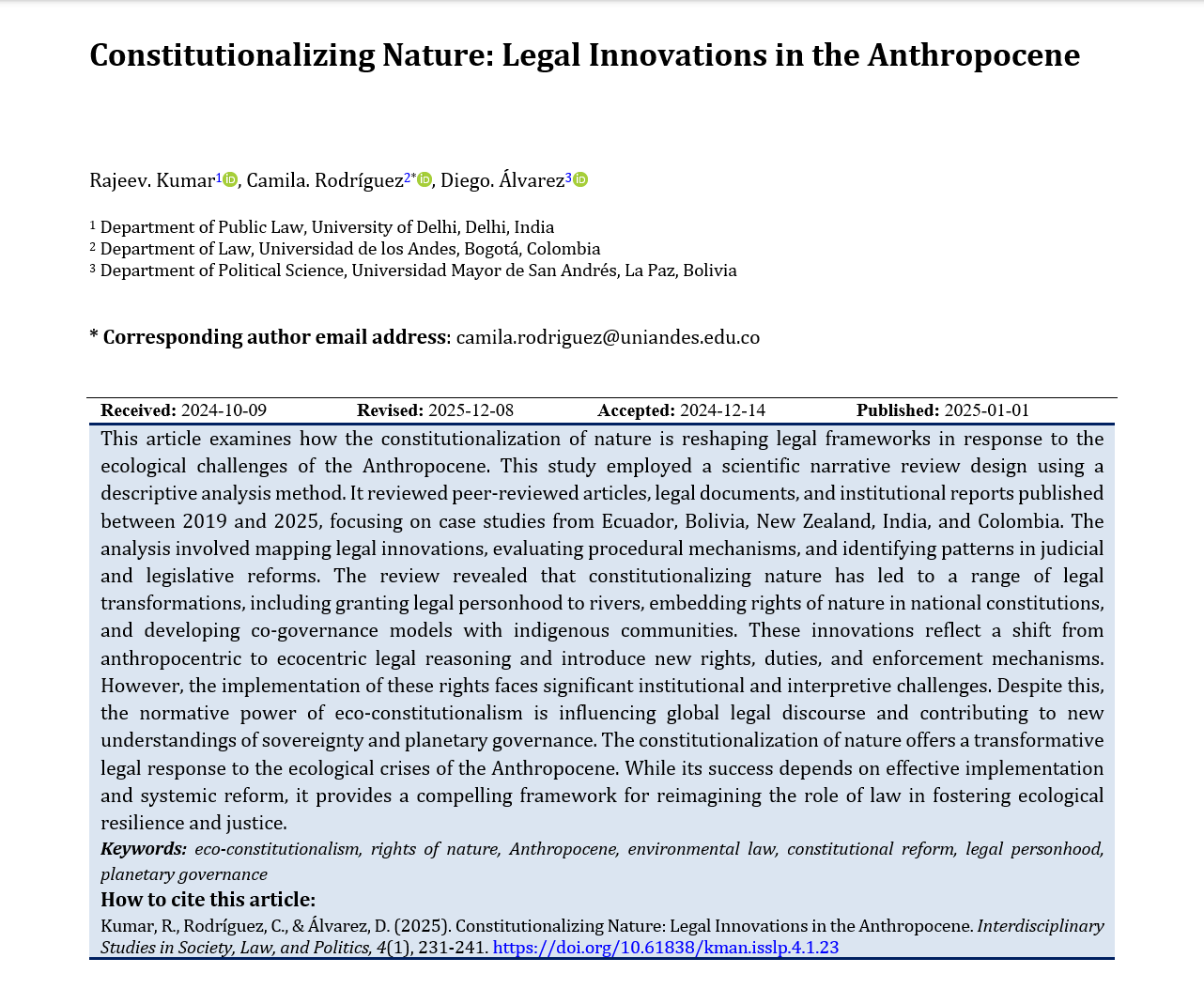Constitutionalizing Nature: Legal Innovations in the Anthropocene
Keywords:
eco-constitutionalism, rights of nature, Anthropocene, environmental law, constitutional reform, legal personhood, planetary governanceAbstract
This article examines how the constitutionalization of nature is reshaping legal frameworks in response to the ecological challenges of the Anthropocene. This study employed a scientific narrative review design using a descriptive analysis method. It reviewed peer-reviewed articles, legal documents, and institutional reports published between 2019 and 2025, focusing on case studies from Ecuador, Bolivia, New Zealand, India, and Colombia. The analysis involved mapping legal innovations, evaluating procedural mechanisms, and identifying patterns in judicial and legislative reforms. The review revealed that constitutionalizing nature has led to a range of legal transformations, including granting legal personhood to rivers, embedding rights of nature in national constitutions, and developing co-governance models with indigenous communities. These innovations reflect a shift from anthropocentric to ecocentric legal reasoning and introduce new rights, duties, and enforcement mechanisms. However, the implementation of these rights faces significant institutional and interpretive challenges. Despite this, the normative power of eco-constitutionalism is influencing global legal discourse and contributing to new understandings of sovereignty and planetary governance. The constitutionalization of nature offers a transformative legal response to the ecological crises of the Anthropocene. While its success depends on effective implementation and systemic reform, it provides a compelling framework for reimagining the role of law in fostering ecological resilience and justice.
Downloads
References
Alexandra, J. (2022). Designer Ecosystems for the Anthropocene—Deliberately Creating Novel Ecosystems in Cultural Landscapes. Sustainability, 14(7), 3952. https://doi.org/10.3390/su14073952
Álvarez, L. (2023). Entre La Parálisis Y La Acción: Un Punto De Partida Para Pensar en La Urgencia De Continuar Viviendo. Rivista Italiana Di Filosofia Politica(3), 77-90. https://doi.org/10.36253/rifp-2017
Arnold, B. (2022). Signs of Invisibility: Nonrecognition of Natural Environments as Persons in International and Domestic Law. International Journal for the Semiotics of Law - Revue Internationale De Sémiotique Juridique, 36(2), 457-475. https://doi.org/10.1007/s11196-022-09920-7
Arnoldussen, T. (2023). Connecting Laws to Climates: A Timely Challenge for Reflexive Lawyers. Tilburg Law Review, 28(1), 38-44. https://doi.org/10.5334/tilr.338
Burdon, P. (2020). Obligations in the Anthropocene. Law and Critique, 31(3), 309-328. https://doi.org/10.1007/s10978-020-09273-9
Chacón, R. (2024). Rethinking Responsibility in a Planetary Age; Or, Facing the Anthropocene With Hans Jonas and Bruno Latour. Isonomía - Revista De Teoría Y Filosofía Del Derecho(59). https://doi.org/10.5347/isonomia.59/2023.656
Chandler, D. (2024). The Black Anthropocene: And the End(s) of the Constitutionalizing Project. Journal of Human Rights and the Environment, 15(1), 37-55. https://doi.org/10.4337/jhre.2024.01.03
Claerhoudt, R. (2023). Ecolaw: Legality, Life, and the Normativity of Nature, by MargaretDavies, London: Routledge, 2022, X + 128 pp. Review of European Comparative & International Environmental Law, 32(1), 169-171. https://doi.org/10.1111/reel.12493
Coombe, R. J., & Jefferson, D. J. (2021). Posthuman Rights Struggles and Environmentalisms From Below in the Political Ontologies of Ecuador and Colombia. Journal of Human Rights and the Environment, 12(2), 177-204. https://doi.org/10.4337/jhre.2021.02.02
Epstein, S. (2022). Rights of Nature, Human Species Identity, and Political Thought in the Anthropocene. The Anthropocene Review, 10(2), 415-433. https://doi.org/10.1177/20530196221078929
Heldeweg, M. A. (2021). Looking Beyond the Horizon. A Normative-Institutional Approach to Sustainability Science; Getting Onto ‘The Balcony’. E3s Web of Conferences, 249, 02001. https://doi.org/10.1051/e3sconf/202124902001
Hunter, D. (2022). Moving Beyond State-Centrism in International Environmental Law. https://doi.org/10.3233/stal220011
Jacob, V. A. (2020). The Implementation of the Paris Agreement on Climate Change, Edited by Vesselin Popovski Routledge, 2020, 316 Pp, £120 Hb, £36.99 Pb, £40.49 Ebk ISBN 9780415791236 Hb, 9780367481483 Pb, 9781315212470 Ebk. Transnational Environmental Law, 9(3), 621-625. https://doi.org/10.1017/s2047102520000321
Kapartziani, C. (2024). Echoes of the Anthropocene: Reimagining Legal Consciousness in the Face of Ecological Crisis. European Scientific Journal Esj, 20(35), 1. https://doi.org/10.19044/esj.2024.v20n35p1
Kotzé, L. J. (2019). Earth System Law for the Anthropocene. Sustainability, 11(23), 6796. https://doi.org/10.3390/su11236796
Liljeblad, J. (2022). Integrating the Anthropocene in Legal Education: Considerations for Asia. Asian Journal of Law and Society, 9(2), 207-227. https://doi.org/10.1017/als.2022.4
Mai, L. (2022). The ‘Question of Possibilities’ as a Leitmotif for Re‐imagining Law for the ‘Anthropocene’. Global Policy, 13(S3), 49-59. https://doi.org/10.1111/1758-5899.13109
McKinnon, C. (2021). Postericide and Intergenerational Ethics. https://doi.org/10.1093/oxfordhb/9780190881931.013.44
Park, S. (2023). Anthropocene and the Future of Labor Law: A Thesis for Constructing a Posthuman Labor Law Beyond Humanism, Toward a Symbiosis of Co-Creating Humans and Nonhumans. Wonkwang University Legal Research Institute, 39(3), 125-157. https://doi.org/10.22397/wlri.2023.39.3.125
Seck, S. L. (2021). A Relational Analysis of Enterprise Obligations and Carbon Majors for Climate Justice. Oñati Socio-Legal Series, 11(1), 254-284. https://doi.org/10.35295/osls.iisl/0000-0000-0000-1139
Tigre, M. A., & Urzola, N. (2021). The 2017 Inter-American Court's Advisory Opinion: Changing the Paradigm for International Environmental Law in the Anthropocene. Journal of Human Rights and the Environment, 12(1), 24-50. https://doi.org/10.4337/jhre.2021.01.02
Toit, L. d., Porras, G. L., & Kotzé, L. J. (2021). Guiding Environmental Law’s Transformation Into Earth System Law Through the Telecoupling Framework. European Energy and Environmental Law Review, 30(Issue 3), 104-113. https://doi.org/10.54648/eelr2021011
Widagdo, S., & Anggoro, S. A. (2022). Combating Ocean Debris: Marine Plastic Pollution and Waste Regulation in Indonesia. The International Journal of Marine and Coastal Law, 37(3), 458-492. https://doi.org/10.1163/15718085-bja10093
Woolley, O. (2020). Ecological Law in the Anthropocene 1. 61-75. https://doi.org/10.4324/9781003001256-8
Woolley, O., & Harrington, C. (2022). Law and Governance in the Anthropocene. Global Policy, 13(S3), 5-10. https://doi.org/10.1111/1758-5899.13168

Downloads
Additional Files
Published
Submitted
Revised
Accepted
Issue
Section
License

This work is licensed under a Creative Commons Attribution-NonCommercial 4.0 International License.





